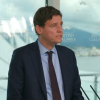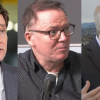KelownaNow reached out to all Member of Parliament candidates running in the 2015 Federal Election in the Kelowna-Lake Country riding and asked them questions pertaining to their electoral district.
Responses received from those running in the Kelowna-Lake Country riding will be posted live on KelownaNow.com between August 31st and September 4th in a randomly selected order.

1. Why are you best suited to represent our region federally?
First, I want to represent Kelowna because I believe it’s an incredible place to live, work, and do business in. I feel fortunate to live here and connect with people in our community. I am fully committed to represent our region in Ottawa.
Second, my experience in the public and private sector has given me the skills to promote Kelowna interests. My background has taught me how to navigate complex organizations while staying focused on meaningful deliverables.
I served 20 years with the Royal Canadian Air Force as a pilot and staff officer. The later part of my career I worked at 1 Canadian Air Division where I was employed as the CF-18 fleet manager. I learned how to effectively traverse the institution’s bureaucracy while staying focused on the mission. I also gained experience in collaborating with international organizations like NORAD and NATO. After five years as the CF-18 fleet manager I was put in charge of transforming the Instrument Check Pilot School. Armed with the latitude I had earned in my previous role, I was able to meet my mandate within six months. I retired six months after that, having served in managerial capacities I had never anticipated when I joined the RCAF as a pilot.
Back in B.C. I was engaged in our community as a tech entrepreneur, responsible for the day-to-day operations of our aviation satellite communications and tracking company. I came to fully understand the importance of federal programs like the Industrial Research Assistance Program (IRAP) and the Scientific Research and Experimental Development Tax Incentive Program (SR&ED). These programs play an important role in our community’s ability to advance itself as a technical centre of excellence and they must be uncompromisingly protected. I also understand and appreciate that various departments of the federal government play an important role in many local businesses, and that the government has the obligation to work with our local community in a collaborative and timely fashion.
2. What is your stance on legalizing marijuana in Canada?
The system we have now is clearly broken. It is incredibly difficult for patients to legitimately access medical marijuana. Criminals are enjoying the proceeds of trafficking marijuana as an illegal substance. Law enforcement and the court and prison system is clogged with cases, then turns a blind eye to minor infractions. The majority of Canadians want to see marijuana legalized. I know we can do better.
The Liberal Party will pass laws that legalize, restrict, and regulate marijuana. This gives us an opportunity to protect our children by limiting access, as with tobacco and alcohol; ensure public safety with quality controls; free up our cops, courts and jails; surface the black market trade in marijuana into the economy; and prevent the proceeds of that trade from funding criminal activities.
3. What is your long-term plan to ensure invasive mussels do not enter the region?
Protecting the Okanagan from invasive mussels is challenging, and uses strategies that require cooperation of all levels of government. Watercrafts on the lake are the likeliest way for the species to get in, and fisheries and watercraft regulation fall under federal jurisdiction.
The plan should incorporate strategies for prevention, early detection of new invaders, and rapid response to eradicate any invasion. Prevention starts with public education for all boaters and watercraft users, and information about invasive species and keeping the hull clean is already part of Transport Canada’s safety manual. Public service announcements and media engagement are also key in getting that message out. Beyond that, a border inspection system for watercraft entering Canada needs to be comprehensive, and inspections along known corridors of spread is important.
The Lake needs to be monitored around points of entry and protected areas, particularly high traffic areas like our marinas. Federal inspectors should work with local stakeholders to ensure that happens.
If invasive mussels are detected here then there needs to be a rapid response for eradication, including emergency release of federal funds to do so if necessary.
4. How are you planning on building and maintaining a political relationship with local First Nations?
As with building relationships with any stakeholder group in Kelowna, meeting with leaders and members of local First Nations groups, acknowledging their concerns and taking stock of their challenges while promoting their success is key. Local First Nations have an impressive track record of business development and prosperity, and that prosperity has economic spinoffs for our entire community.
First Nations relationships with government are enshrined in legislation with constitutionally mandated obligations. Furthermore, recognizing and respecting their title and rights is critical to resource management and transportation, infrastructure access, and to the social and economic well-being of First Nations people.
A Liberal government will be committed to renewing its partnership with First Nations by critically evaluating the Indian Act, by making investments in First Nations education, by lifting the funding cap of 2 per cent, and by creating mechanisms to resolve grievances for historical treaties and modern land-claim agreements.
5. How will your party support the provincial/national economy? Do you think the Canadian economy is slumping into a recession?
Part 1
A Liberal Government will take an expert inspired approach to stimulating economic growth and job creation. An immediate investment into middle class income earners and families will allow nine out of 10 Canadians families to spend, save or invest in the Canadian economy. It will also immediately lift over 300,000 children out of poverty.
The Liberals latest Infrastructure announcement will inject billions of most-needed infrastructure money into Canadian communities. This investment will not only help to modernize our dated and failing infrastructure, it is one of the best ways to create well paying jobs.
Funding these initiatives will be accomplished by eliminating wasteful spending; means testing government benefits and adding a small income tax increase to Canada’s wealthiest. The massive influx of capital into the newly released infrastructure revitalization program will come from a decision to invest in ourselves and acknowledgement of the fact that a small short-term deficit maybe be required to stimulate our battered economy.
Part 2
We will find out shortly if we have met the threshold of a technical economic recession. Certainly, the first five months of negative growth has diminished the chances of the surplus that was promised by Stephen Harper. In fact, the Parliamentary Budget Officer is now forecasting that the 1.4 Billion dollar surplus predicted by the Conservative Government is now looking more like a 1 billion dollar deficit. 50 months of trade deficits and increasing consumer debt is exacerbating the problem.
Stephen Harper’s record over the last ten years is one of wasted opportunity and decline. Harper has the worst economic growth record of any Canadian Prime Minister since R.B. Bennett in the depths of the Great Depression. Our economy has shrunk in each of the first five months of this year, and the Bank of Canada says that Canada is the only G7 country in recession.
Harper’s plan has failed. Canadians have experienced year after year of broken promises, failure to make promised investments, and fights with provinces, territories, and municipalities instead of forming the partnerships we need to move forward.

6. Affordable living in the region is a problem, is there anything you can do to change this?
A Liberal government will provide a new, dedicated funding envelope for social infrastructure. We will prioritize investment in affordable housing and seniors’ facilities, early learning and childcare, and cultural or recreational infrastructure. Our plan will renew federal leadership in affordable housing, help build more housing units, refurbish existing ones, renew existing co-operative agreements, and provide operational funding support for municipalities. We will also fund the creation of thousands of new childcare spaces, enhance their quality, and ensure that affordable childcare spaces are available to more families who need them.
A Liberal government will reform and increase the transparency of the New Building Canada Fund by providing clearer project criteria and more efficient, fast approval processes. We will also boost investment in social infrastructure by nearly $6 billion over the next four years, and almost $20 billion over ten years.
7. British Columbia is suffering from a doctor shortage, what steps do you have in place to address this issue?Doctor shortages are challenging to address because the lead time for training a specialist physician is about ten years, a family physician takes about seven years, and the goalposts may have shifted between the time when needs were assessed, and when they could be filled.
The key is to enable the fluidity of movement of physicians, so doctors themselves are able to identify and fill the need more quickly rather than relying on the tight control of regulatory bodies and training facilities. Locations with higher need could offer bonuses to physicians who practice there, and you allow a free market system to attract physicians to where they are needed most.
That kind of system requires cooperation of the provincial licensing and credentialing authorities for mobility, and provinces together with municipalities to fill local need.
The Conservative government has completely neglected national leadership on healthcare. There has not been a First Ministers’ Accord on Healthcare since the Liberals negotiated one in 2004. That agreement had special measures for national planning of healthcare providers, and created the Canada Health Transfer. There has been no effort by the Conservative government to actually fulfill Harper’s promise to reduce wait times in 2006.
Although details of our platform on healthcare have yet to be released, it is safe to say a Liberal government would work collaboratively with the provinces to identify areas of high priority and try to resolve them with special initiatives as we have demonstrated in the past.
8. Wildfires have been plaguing B.C. for the better part of 2015, pushing our expenditures into the hundreds of millions. How will you push for more federal involvement in terms of funding, resources, etc.?
The Liberal government has prevention and protection against wildfires imbedded in its Green Infrastructure initiative.
A Liberal government will provide dedicated funding to invest in a broad range of projects, including but not limited to protections against wildfires. These and other efforts will be undertaken in partnership with other orders of government and based on the best available science. We will boost investment in green infrastructure by nearly $6 billion over the next four years, and almost $20 billion over 10 years.
I will aggressively pursue this new funding plan to enhance local efforts in combatting and preventing local seasonal wildfires.
Moreover, we need to recognize that July 2015 was the hottest July on record. Climate change is contributing to increasingly dry conditions and the increasing threat of wildfires. A Liberal government will be focused on working domestically and internationally to mitigate climate change.
9. By mid-August, most of Interior B.C. was under a Level 4 drought classification, how would you push/promote for better water conservation in British Columbia?
We have been seeing increasing pressures on water availability and water consumption as the community grows. More than half the water use in the Okanagan Basin is agricultural (55 per cent), with about a third consumed by residents (31 per cent).
We would collaborate with agriculture representatives to provide incentives for a more efficient water use, and work with the provinces to ensure better watershed protection. We would restore funding for research on freshwater management and habitats.
Climate Change is also having an impact on snowpack levels, evaporative loss from Okanagan Lake, and increased water demand in the summer. A Liberal government will be committed to mitigating climate change.
10. What would you propose to help combat gang activity and drug trafficking in the riding?
The current approach on drugs is one of the catalysts financing gun-runners and street crimes. The issue is that Canada should be regulating and controlling marijuana trade to protect children, our communities and to prevent the funds from flowing into the hands of drug runners and street gangs. A Liberal Government will adjust to the reality that controlling and regulating marijuana is a way to both protecting public and ensuring that we are not financing gangs with millions of illegally sourced dollars.
11. The region is in need of federal funding to upgrade popular tourism destination, how would you make this happen or a priority?
A Liberal government will be committed to working with all levels of government and First Nations communities to improve highways and invest in road upgrades and infrastructure. We have announced plans to not only directly fund infrastructure projects but also create a Canada Infrastructure Bank to provide low-cost financing for such projects. A Liberal government will automatically transfer any uncommitted federal infrastructure funds near the end of the fiscal year to municipalities, through a temporary top-up of the Gas Tax Fund. This will ensure that no committed infrastructure money is allowed to lapse, but it is instead fully invested in communities.
I have a lot of experience working with Transport Canada and know we haven’t yet realized Kelowna’s potential as a regional or national air hub. As Kelowna’s Member of Parliament, I would advocate for our community to expand that capacity further.
I would also like to see the proposed conference and trade center construction get underway in Kelowna so people from all over can congregate here and start taking advantage of our community’s business friendly environment. Hosting conferences facilitates the stretching of the tourism business into the shoulder seasons of spring and fall. I would work with development proponents and the City to facilitate access to strategic federal funding support where possible.
12. Is there anything else you would like voters to know?
At the heart of the Liberal platform is the belief that Canadians deserve better governance and open leadership. The Country will emerge as a strong united 21st century ready Nation only if we ALL win. The economy asks for better qualitative and quantitative interventions and socially acceptable policies that do not hinder our natural resources but foster true and fair progress across all classes of citizens.
Kelowna is a prime example of a successful and courageous community. Through years of booms and busts we have not only survived but thrived. By virtue of leveraging the local natural beauty, harnessing and sponsoring our people entrepreneurial spirit and respecting our agricultural grassroots, our community has been able to evolve and adapt to the new demands of more sophisticated and global markets.
Kelowna is poised to excel by continuing promoting technological and value-add industries. Within the Liberal transformative political framework, the introduction of innovative and fiscally responsible investments at national, provincial and municipal level, we will grow our economy; improve health, well-being and the overall quality of Canadians’ life.
I am committed to this good-news real-change set of solutions and ready to serve again.
https://www.facebook.com/fuhr2015

For more information on Stephen Fuhr, please visit his website here.
The 2015 Federal Election is Monday, October 19th.
















